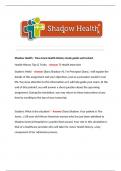Shadow Health - Tina Jones Health History study guide well solved.
Health History Tips & Tricks: - Answer TJ Health Interview
Student: Hello! - Answer Diana Shadow: Hi. I'm Preceptor Diana. I will explain the
details of this assignment and your objectives, just as a preceptor would in real
life. Pay close attention to this information as it will help guide your exam. At the
end of this prebrief, you will answer a short question about the upcoming
assignment. During the simulation, you may return to these instructions at any
time by scrolling to the top of your transcript.
Student: What is the situation? - Answer Diana Shadow: Your patient is Tina
Jones:, a 28-year-old African American woman who has just been admitted to
Shadow General Hospital for a painful foot wound. Your role in this simulation is
that of a healthcare provider who will take Ms. Jones' health history, a key
component of her admission process.
,Student: What are my objectives in this assessment? - Answer Diana Shadow: A
health history requires you to ask questions related to Ms. Jones' past and
present health, from her current foot wound to her pre-existing conditions. You
will also want to review Ms. Jones' systems, psychosocial history, and family
medical history. These assessments together will give you a comprehensive
picture of Ms. Jones' overall health. If you discover any disease states, ask about
symptoms and the patient's experiences of them. Your questioning should cover a
broad array of the symptoms' characteristics. Throughout the conversation, you
should educate and empathize with Ms. Jones when appropriate to increase her
health literacy and sense of well-being. Regardless of whether you have assessed
Ms. Jones previously, ask all questions that are necessary for obtaining a
complete health history. While you should communicate with patients using
accessible, everyday language, it is standard practice to use professional medical
terminology everywhere else, such as in documenting physical findings and
nursing notes. You may complete the exam activities in any order and move
between them as needed. After obtaining Ms. Jones' health history, you will
complete an information processing activity. You will identify and prioritize
diagnoses, then create a plan to address the identified diagnoses.
Student: What else will this exam involve? - Answer Diana Shadow: You will
complete nursing tasks to protect the patients safety, privacy, and health. You can
document your findings, including vital signs, in the Electronic Health Record. This
record provides necessary information for healthcare professionals who will
continue patient care. Besides Subjective Data Collection, and Education and
,Empathy, there are activities within the simulation that provide valuable practice
for their real-world counterparts, but they are not automatically graded by the
simulation.
Student: How will I be evaluated? - Answer Diana Shadow: In this assignment, you
will be evaluated on your Subjective Data Collection, as well as your Education
and Empathy. Your success in Education and Empathy is based on whether you
promptly respond after identifying a moment worthy of therapeutic
communication. The evaluation of your interview is dependent on how you word
your questions therapeutically and precisely and explore all relevant topics with
comprehensive breadth and depth. You will also be evaluated on your ability to
collect data and form nursing diagnoses in the information processing activity.
This assignment takes on average between 90 and 110 minutes. This exam may
take longer than in real life, because in this safe simulation, students of all
experience levels can take time to hone and review their skills. You can pause and
resume the assignment at any time; your work is always saved automatically.
Student: How does this assignment prepare me for the real world? - Answer
Diana Shadow: In this assessment, you will become familiarized with the structure
and content of a health history exam so that with real-life patients, you can: º ask
effective and comprehensive questions º obtain a thorough health history º
evaluate the patient's risk of disease, infection, injury, and complications º
educate and empathize º reflect on your experience and identify areas to improve
, º identify and prioritize nursing diagnoses º and develop a plan to address nursing
diagnoses.
Diana Shadow: In 1 or 2 sentences, answer this question to help prepare for the
upcoming exam: Why is it important to obtain a patient's complete health
history? - Answer Student: So that you understand if there are any problems
related to their chief complaint. Also, to help treat their current condition.
Diana Shadow: Time to begin. - Answer
Patient Exam - Vital Signs: - Answer Height: 170 cm, Weight: 90 kg, BMI: 31,
Random blood glucose: 238, Temperature: 102.4° F, Blood pressure: 138/90
mmHg, Heart rate: 90, Respiratory rate: 18, O2 sat: 98%
Patient Exam - Interview: - Answer
Student: Hello, my name is Catlain, I am your nurse today. - Answer Tina Jones:
Hey.
Student: Can you confirm your name? - Answer Tina Jones: Tina Jones:.




